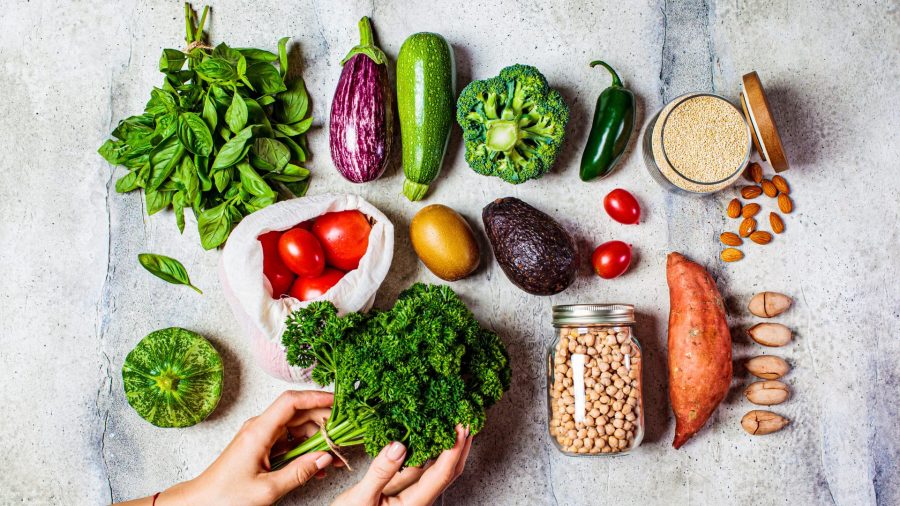Best Brands for Gluten Free BBQ Sauce in Houston
Best Brands for Gluten Free BBQ Sauce in Houston
Blog Article
All About Healthy And Balanced Food: Benefits of Taking On Plant Based Alternatives
The conversation surrounding plant-based diet regimens has gotten considerable focus recently. Lots of individuals are exploring the prospective wellness advantages, dietary advantages, and ecological impacts related to these dietary choices. As individuals end up being a lot more knowledgeable about their food's influence on wellness and sustainability, concerns occur about the practicalities of adopting such a lifestyle. What specific adjustments can one anticipate, and just how might these selections improve not only personal wellness yet likewise the world's future?
Understanding Plant-Based Diet Plans
Many individuals associate plant-based diet regimens primarily with vegetarianism or veganism, these diets can encompass a large variety of consuming patterns that prioritize whole, minimally processed plant foods. Such diet regimens commonly include fruits, veggies, whole grains, seeds, beans, and nuts, while restricting or removing pet products. This adaptability allows people to tailor their nutritional selections according to individual choices and nutritional needs. Some might adopt a mostly plant-based diet regimen while still occasionally consuming meat or dairy products, commonly referred to as a flexitarian strategy. The emphasis continues to be on including even more plant foods, which can lead to a varied variety of meals and flavors. Recognizing these different interpretations of plant-based consuming is essential for appreciating its accessibility and appeal in modern food culture.
Wellness Conveniences of Plant-Based Foods
The health advantages of plant-based foods are substantial, offering a nutrient density advantage that supports overall health. Research study suggests that these foods can boost heart wellness and play a vital function in reliable weight management. By incorporating much more plant-based choices, people might boost their dietary choices and advertise long-lasting health and wellness.
Nutrient Density Advantage
Nutrient thickness plays an important role in the health and wellness benefits of plant-based foods, making them an engaging choice for those looking for a well balanced diet. Plant-based foods, such as fruits, vegetables, beans, nuts, and entire grains, are often rich in essential vitamins, minerals, and antioxidants while being lower in calories. This high nutrient density permits individuals to consume fewer calories while still meeting their nutritional demands. Additionally, these foods are loaded with nutritional fiber, promoting digestion wellness and helping in weight management. By integrating nutrient-dense plant-based alternatives, customers can boost their general health and wellness, support their body immune systems, and lower the threat of chronic diseases. Ultimately, the nutrient thickness of plant-based foods emphasizes their value in a health-conscious lifestyle.
Heart Health Renovation

Weight Monitoring Assistance
Along with advertising heart wellness, a plant-based diet plan can considerably help in weight administration. This dietary strategy highlights entire foods such as fruits, veggies, legumes, nuts, and entire grains, which are typically lower in calories and greater in fiber compared to animal-based items. The high fiber material helps enhance satiety, lowering overall calorie consumption. Moreover, plant-based diets are often abundant in important nutrients while reduced in undesirable fats, making it easier to maintain a healthy weight. Plant Based Beef. Research study shows that people that take on a plant-based way of life tend to have reduced body mass indexes (BMIs) and experience more effective weight reduction compared to those who consume meat-heavy diet regimens. Accepting plant-based alternatives is a strategic choice for reliable weight monitoring.
Nutritional Value of Plant-Based Active Ingredients
Plant-based active ingredients are rich in necessary nutrients, using a diverse array of vitamins, minerals, and antioxidants that add to general health and wellness. A comparison of protein sources reveals that while animal products are commonly considered as superior, lots of plant-based alternatives provide adequate protein and other helpful substances. Recognizing the dietary worth of these ingredients can help individuals make educated nutritional options.
Necessary Nutrients in Plants
Nutrient-rich active ingredients located in plants supply a diverse selection of essential vitamins and minerals that contribute greatly to total health. These active ingredients are rich in vitamins A, C, and K, which support immune feature, vision, and blood clot, respectively. Additionally, plants provide important minerals such as potassium, calcium, and magnesium, essential for heart health, muscle mass function, and bone strength. The visibility of fiber in plant-based foods aids food digestion and advertises a healthy gut microbiome. Anti-oxidants, discovered abundantly in vegetables and fruits, assistance combat oxidative stress and reduce swelling. Many plant foods are low in calories yet high in nutrients, making them an excellent option for those seeking to preserve a healthy weight while making certain suitable nutrient intake.

Comparing Protein Resources
Protein sources differ substantially in their nutritional accounts, with plant-based active ingredients supplying special advantages. Unlike pet proteins, which frequently have saturated fats and cholesterol, plant proteins have a tendency to be lower in these unhealthy parts. Legumes, nuts, seeds, and entire grains are abundant in crucial amino acids, fiber, vitamins, and minerals. Lentils provide high healthy protein material alongside considerable iron and folate, while quinoa is a total healthy protein, using all nine essential amino acids. Additionally, plant-based proteins are commonly gone along with by anti-oxidants and phytochemicals that sustain overall health. The change to plant-based protein resources not only boosts dietary intake yet also straightens with sustainable dietary methods, decreasing ecological impact and advertising long-lasting health advantages.
Environmental Effect of Plant-Based Consuming
As awareness of environment change expands, many individuals are discovering sustainable dietary selections that can considerably reduce their ecological footprint. Plant-based consuming has actually become a significant contributor to lowering greenhouse gas emissions, which are largely connected with animals production. The growing of fruits, vegetables, grains, and vegetables typically calls for fewer resources, such as water and land, compared to pet farming. In addition, plant-based diet regimens can bring about reduced logging, as less land is required for grazing livestock or growing animal feed. By moving towards plant-based choices, customers learn the facts here now can sustain biodiversity and advertise much healthier communities. In general, accepting plant-based consuming not only advantages individual health and wellness yet also represents an important step towards ecological sustainability and preservation initiatives.
Conquering Common Misconceptions
While lots of people acknowledge the advantages of a plant-based diet regimen, numerous misconceptions commonly deter them from totally embracing this lifestyle. A common idea is that plant-based diets lack sufficient protein; nonetheless, many plant sources, such as vegetables, nuts, and tofu, provide adequate protein. Furthermore, some assume that this diet regimen is costly, when as a matter of fact, staples like beans, rice, and seasonal veggies can be fairly budget-friendly. Another mistaken belief is that plant-based eating is overly restrictive, whereas it in fact offers a diverse variety of tastes and foods. Lots of fret that a plant-based diet may lead to deficiencies, yet with appropriate planning, individuals can obtain all required nutrients, including vitamins and minerals, while taking pleasure in a wide range of delicious meals.
Tips for Transitioning to a Plant-Based Way of life
Making the change to a plant-based lifestyle can be an enhancing experience, though it typically calls for some guidance to browse the first adjustments. Initially, people are urged to begin progressively, including even more fruits, veggies, beans, and whole grains right into their meals while minimizing meat and milk intake. Meal planning is important; preparing a weekly food selection can aid ease the change and prevent last-minute undesirable selections. Discovering brand-new dishes and cooking look what i found techniques can additionally maintain and improve the experience enjoyment concerning plant-based eating. Additionally, joining support system or communities can offer inspiration and share important suggestions. Ultimately, staying educated regarding nourishment guarantees balanced dishes, avoiding shortages while fostering a healthy, rewarding plant-based lifestyle.
Delicious Plant-Based Meal Ideas
Checking out scrumptious plant-based meal concepts can influence people to embrace a much more nutritious diet. One preferred choice is a hearty quinoa salad, including cherry tomatoes, cucumber, and a zesty lemon-tahini dressing. One more favorite is a mouthwatering lentil stew, loaded with carrots, celery, and aromatic herbs, perfect for a comforting dinner. For breakfast, overnight oats made with almond milk, chia seeds, and topped with fresh berries give a nutritious begin to the day. Furthermore, a vivid veggie stir-fry with tofu and a selection of colorful veggies can be a fast yet pleasing dish. Velvety avocado toast on whole-grain bread, sprayed with seeds and seasonings, supplies an easy yet flavorful treat. These dishes display the variety and richness of plant-based eating.

Frequently Asked Inquiries
Can a Plant-Based Diet Plan Supply Enough Protein?
The question of whether a plant-based diet plan can supply sufficient protein prevails. Many resources, consisting of vegetables, nuts, seeds, and whole grains, can meet healthy protein needs properly, supporting a nutritious and well balanced diet regimen for people.
Are Plant-Based Diet Regimens Suitable for Kid?
The viability of plant-based diets for youngsters relies on careful preparation. Adequate nutrients have to be ensured, including vitamins, minerals, and proteins. With proper advice, such diet regimens can support healthy and balanced development and advancement in kids.
How Do I Eat in restaurants on a Plant-Based Diet plan?
Eating out on a plant-based diet entails seeking dining establishments with varied menus, requesting modifications, and checking out vegan-friendly options. Preparation ahead and communicating dietary choices can boost the dining experience while maintaining dietary choices.
What Are Common Irritants in Plant-Based Foods?
Typical allergens in plant-based foods include soy, gluten, nuts, and seeds - Plant Based Chicken. Individuals adhering to a plant-based diet regimen ought to know these allergens and review labels very carefully to avoid unfavorable reactions and assure safe usage
Can Plant-Based Diets Assist With Fat Burning?
Study suggests that adopting a plant-based diet plan might facilitate weight reduction due to its commonly lower calorie thickness and helpful site greater fiber material. This combination can improve satiety, aiding individuals handle their caloric consumption efficiently. Lots of individuals connect plant-based diet regimens mostly with vegetarianism or veganism, these diet regimens can include a vast array of eating patterns that focus on whole, minimally processed plant foods. Nutrient density plays a vital role in the health benefits of plant-based foods, making them a compelling choice for those looking for a well balanced diet regimen. Plant-based diet regimens have actually been shown to markedly enhance heart health and wellness, as they commonly include elements that support cardiovascular feature. In enhancement to promoting heart health, a plant-based diet regimen can significantly help in weight administration. A typical idea is that plant-based diet regimens lack sufficient healthy protein; nevertheless, countless plant sources, such as legumes, nuts, and tofu, provide adequate protein.
Report this page